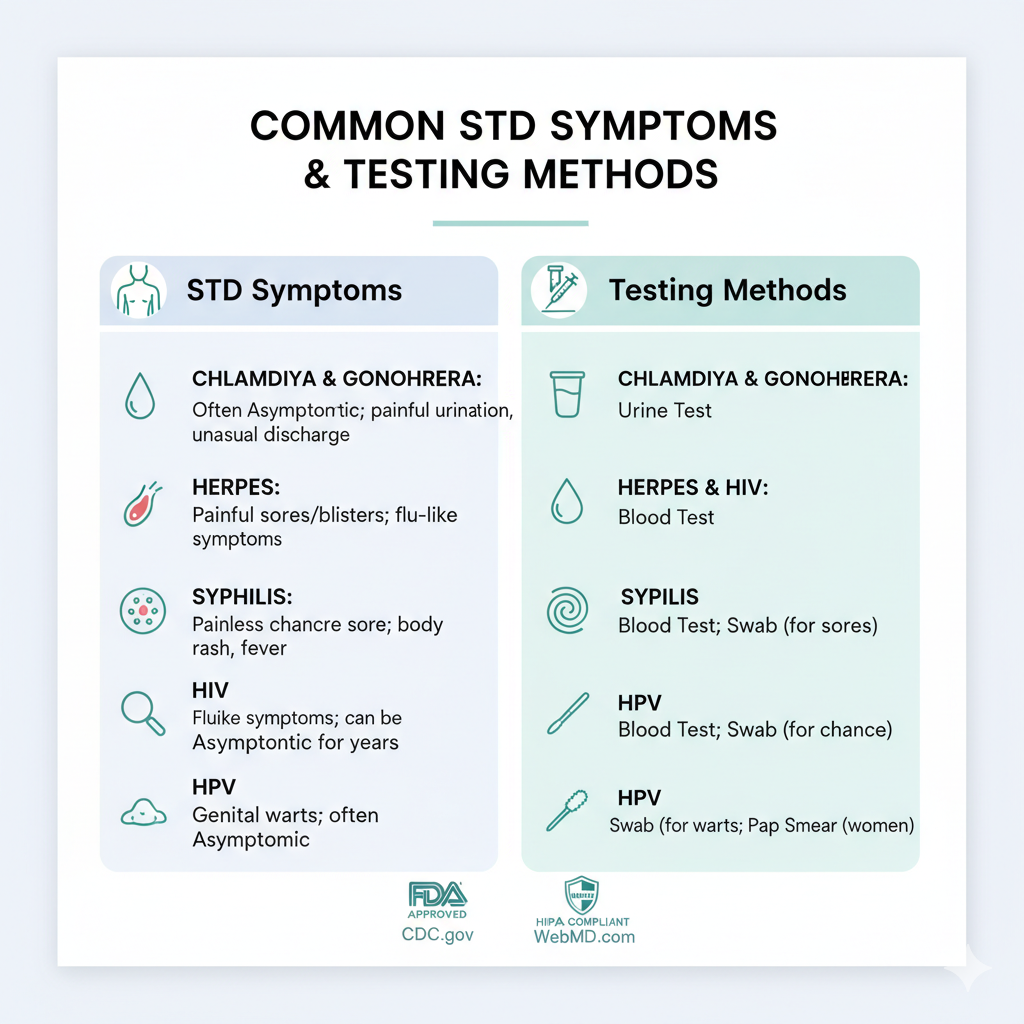Get tested privately with STDcheck.com – save $10!
- Myth 1: You'd Know if You Had an STD – There Are Always Obvious Symptoms.
- Myth 2: Only Promiscuous People Get STDs.
- Myth 3: A Quick Look by a Doctor Is Enough to Diagnose an STD.
- Myth 4: You Can't Get an STD from Oral Sex.
- Myth 5: Once You've Been Treated for an STD, You're Immune.
- The Importance of Regular Testing
- Take Control of Your Health
Get tested privately with STDcheck.com – save $10!
It’s 2025, and while technology and medicine have advanced significantly, some persistent myths about STD (Sexually Transmitted Disease) testing continue to circulate. These misconceptions can lead to anxiety, delayed testing, and potentially serious health consequences. At SafeHealthCheck.com, we believe in empowering you with accurate information. Let’s debunk the most common STD testing myths and get you up to speed on what you truly need to know.

Chart showing common STD symptoms and recommended testing methods for various sexually transmitted diseases.
Get tested privately with STDcheck.com – save $10!
Myth 1: You’d Know if You Had an STD – There Are Always Obvious Symptoms.
This is perhaps the most dangerous myth of all. The truth is, many STDs, like Chlamydia, Gonorrhea, and even early-stage HIV, can be asymptomatic, meaning they show no noticeable symptoms for extended periods, if ever. You could be carrying an STD and unknowingly transmitting it to partners without any indication.
The Reality: The absence of symptoms does not mean the absence of an STD. Regular testing is crucial for early detection and treatment, preventing potential complications like infertility or increased susceptibility to other infections.
Myth 2: Only Promiscuous People Get STDs.
This stigmatizing myth is not only untrue but also a significant barrier to people seeking testing. STDs don’t discriminate based on the number of partners you’ve had. Anyone who is sexually active is at risk. It only takes one encounter with an infected person to contract an STD.
The Reality: If you are sexually active, you are at risk. Open communication with partners and consistent condom use can reduce risk, but testing remains the only way to confirm your status.
Myth 3: A Quick Look by a Doctor Is Enough to Diagnose an STD.
While a doctor can visually identify some conditions like genital warts or herpes sores, many STDs require specific laboratory tests for accurate diagnosis. A visual inspection alone is insufficient for conditions like Chlamydia, Gonorrhea, Syphilis, or HIV.
The Reality: STD testing involves various methods depending on the suspected infection. These can include:
- Urine tests: Commonly used for Chlamydia and Gonorrhea.
- Blood tests: Essential for HIV, Syphilis, and Herpes (though not always for active outbreaks).
- Swab tests: Taken from the affected area (genitals, mouth, rectum) for accurate diagnosis of certain bacterial or viral infections.
These tests are often FDA-approved and processed in HIPAA-compliant laboratories, ensuring accuracy and privacy.
Get tested privately with STDcheck.com – save $10!
Myth 4: You Can’t Get an STD from Oral Sex.
Another pervasive myth! STDs like Herpes, Gonorrhea, Syphilis, and even HIV can be transmitted through oral sex. Any unprotected sexual activity carries a risk of transmission.
The Reality: All forms of sexual contact carry a risk of STD transmission. Practicing safe sex, including using condoms or dental dams, is important regardless of the type of sexual activity.
Myth 5: Once You’ve Been Treated for an STD, You’re Immune.
Unfortunately, this is false for most STDs. While treatment can cure bacterial STDs like Chlamydia and Gonorrhea, and manage viral STDs like Herpes and HIV, it does not provide immunity. You can be reinfected if you are exposed again.
The Reality: Maintaining open communication with partners, practicing safe sex, and getting retested periodically, especially with new partners, are essential for ongoing prevention and management.
The Importance of Regular Testing
Understanding the facts about STD testing is crucial for your sexual health. Don’t let myths prevent you from getting the care you need. Regular testing is a responsible and proactive step you can take for yourself and your partners. I learned that getting tested is quick, private, and an essential part of maintaining overall well-being.
For comprehensive resources and further information, you can always refer to reputable sources like the Centers for Disease Control and Prevention (CDC) at CDC.gov or WebMD at WebMD.com.
Take Control of Your Health
Getting tested doesn’t have to be a complicated or embarrassing process. Many services offer confidential and convenient options.
Get tested privately with STDcheck.com – save $10!
Affiliate Disclosure: We earn a commission from STDcheck.com links on SafeHealthCheck.com. This helps us continue to provide valuable health information.

